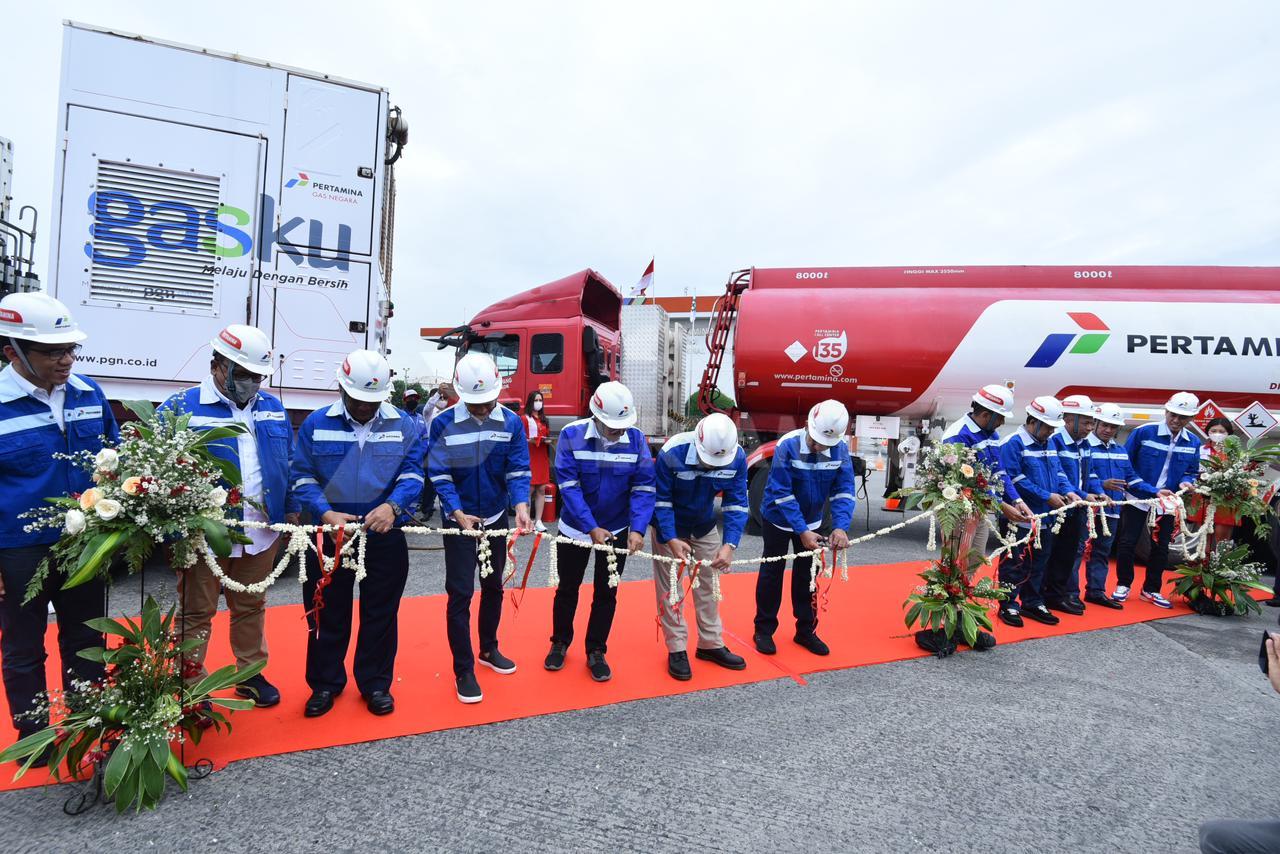
Cleaner and More Efficient, Pertamina Supports the Government's CNG use for Transportation
Jakarta, December 28, 2022 - Pertamina fully supports the Government's directives for using gas fuel for transportation modes. This support is realized through the DDF (Diesel Dual Fuel) implementation, a combination of diesel fuel and CNG (Compresses Natural Gas) launched at the Plumpang Terminal on Tuesday, December 27, 2022.
The CNG implementation is a synergy within the energy transition framework by PT Pertamina Patra Niaga as the manager of the Logistics Tank Trucks and PT Pertamina Gas Negara (PGN) Tbk. as CNG provider. PGN provides mobile SPBG and LNG/CNG Trucking to accelerate the energy mix from gas, both for transportation and industry.
The CNG for transportation modes is Pertamina's commitment to reduce carbon emissions, in which natural gas carbon emissions are 40% lower than fuel oil. Besides that, Indonesia has the potential for large gas reserves. Thus, to realize national energy independence and sovereignty, it is very important to accelerate the increase in the energy mix from domestically produced gas.
The Director General of Oil and Gas (Dirjen Migas) of the Ministry of Energy and Mineral Resources, Tutuka Ariadji, appreciates and encourages Pertamina's steps in implementing DDF on tank cars. According to him, this also follows Pertamina's program regarding Net Zero Emissions in 2060. It is hoped that in 2024 DDF can be implemented in 89 Pertamina tank cars.
"We realize that Pertamina has made a major contribution in this field, utilizing gas with PGN and Pertamina Patra Niaga for providing and distributing BBG. In the future, we will continue to encourage more contributions, especially with the DDF for this Pertamina tank car," Tutuka said.
Furthermore, Tutuka appreciated Pertamina which has distributed energy throughout the country while maintaining energy security. “Indonesia is a difficult country to distribute its energy. So I appreciate Pertamina for being able to do that so far, and to this day, we do not have a shortage of supply (energy)," he said.
Director of Logistics and Infrastructure of PT Pertamina (Persero), Erry Widiastono, said the DDF implementation was Pertamina's commitment to reducing carbon emissions and implementing ESG (Environmental, Social, and Governance) in the company.
"It is hoped that with the DDF implementation, operational costs will be more efficient, and the CNG use volume will increase in accordance with the Minister of Energy and Mineral Resources 47/2021 target, and it will create an ecosystem for using BBG as transitional energy," Erry said.
Director of Strategy and Business Development of PGN Heru Setiawan stated that PGN, as Pertamina's Subholding Gas, fully supports Pertamina's BBG conversion program. Besides, PGN has targeted to expand the CNGuse for land transportation in the next five years. The conversion to BBG for fuel logistics trucks is hoped to improve the SPBGs' optimization.
PGN targets to convert 1,000 trucks/bus units in the next five years. Gradually, the conversion to CNG will be applied to around 18,000 small vehicles.
PGN has prepared 57 SPBG locations, including the Mobile Refueling Unit (MRU), to provide and distribute CNG, as CNG for land transportation. CNG and its supporting infrastructure for land vehicles will be supplied by PGN's subsidiary, PT Gagas Energi Indonesia.
SPBG locations will be spread across the Riau Islands, South Sumatra, Lampung, Banten, DKI Jakarta, West Java, Central Java, East Java, and Kalimantan. The SPBG location is on the Sumatra-Java main route and the national logistics route. Thus, it will encourage Pertamina to convert logistics trucks using CNG.
PGN's innovation provides mobile SPBG and LNG/CNG Trucking as an effort to accelerate the energy mix from gas, both for transportation and industry.
In the initial phase, the Gas Transport Module (GTM) and Mobile Refueling Unit (MRU) will be used to supply CNG to fuel trucks. The next phase is the Plumpang SPBG revitalization to supply CNG to fuel trucks and public transportation.
"In principle, natural gas for land vehicles is maximized to utilize the domestic natural gas potential, which is still abundant during this energy transition period. As a bonus, natural gas for vehicle fuel can be more efficient and environmentally friendly. Of course, it can contribute to reducing carbon emissions by up to 40%," Heru said.
Present at the launching of DDF implementation are the Director General of Oil and Gas Tutuka Ariadji, Director of Road Transportation Facilities Ir. Danto Restyawan, M.T, Chairman of the National Transportation Safety Committee (KNKT) Soerjanto Tjahjono, and General Chair of Hiswana Migas Rachmad Muhamadiyah.**